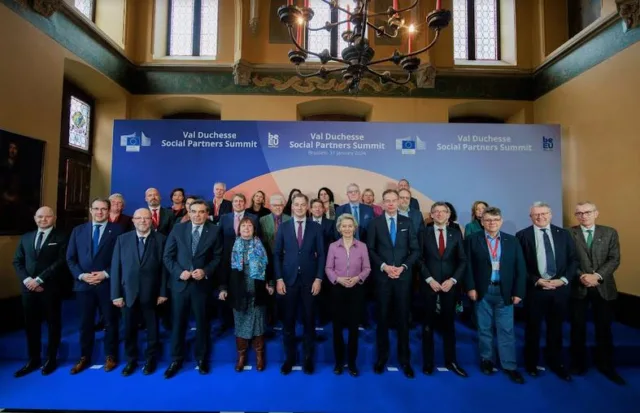EU leaders and social partners sign the ‘Tripartite Declaration for a Thriving European Social Dialogue’, pledging to bolster cooperation and address key economic challenges. In a landmark gathering at the Val Duchesse Social Partners Summit, the European Commission, alongside the Belgian Presidency of the Council of the EU and European social partners, have inked a significant agreement titled the ‘Tripartite Declaration for a Thriving European Social Dialogue’. This declaration symbolizes a renewed dedication to fortifying social dialogue at the EU level and collaborating to confront pivotal challenges within our economies and labor markets. The primary objective is to bolster thriving businesses, foster quality jobs and services, and enhance working conditions across the continent.
The Val Duchesse Social Partners Summit builds upon previous initiatives and recommendations aimed at reinforcing social dialogue at both national and EU levels. It aligns with the principles outlined in the Treaty on the Functioning of the European Union (TFEU), Principle 8 of the European Pillar of Social Rights, and the Pillar Action Plan.
The Significance of Social Dialogue
Social dialogue, which entails discussions between representatives of workers and businesses, is a cornerstone of the European social model. It plays a pivotal role in driving economic prosperity, enhancing living and working standards, boosting the competitiveness of EU enterprises, and effectively managing transitions, notably in the realms of green and digital transformations.
Key Outcomes
Outlined within the summit are several key outcomes signaling a commitment to reinforce social dialogue:
- Addressing Labor and Skills Shortages: A pressing concern highlighted by nearly two-thirds of small and medium-sized businesses, labor and skills shortages impede general business activities. To tackle this, the Commission, in collaboration with social partners, will unveil an action plan in spring 2024. Additionally, all signatories pledge to bolster efforts to integrate more individuals into the labor market, enhance working conditions, streamline qualification recognition, and facilitate the integration of foreign workers.
- Prioritizing European Social Dialogue: Recognizing the pivotal role of social partners in adapting to economic and social shifts, especially in the face of green and digital transitions, the declaration emphasizes the EU’s commitment to promoting and respecting the role of social dialogue.
- Establishment of a European Social Dialogue Envoy: The Commission will appoint a dedicated envoy tasked with promoting and strengthening social dialogue at both European and national levels. This envoy will serve as a central point of contact for social partners to voice concerns related to social dialogue.
- Launch of a Pact for European Social Dialogue: A comprehensive initiative involving bipartite and tripartite discussions to reinforce social dialogue at the EU level. This pact aims to secure institutional and financial support, capacity building through the European Social Fund Plus (ESF+), and an agreed approach for negotiating, promoting, and implementing social partner agreements by early 2025.
European Commission President Ursula von der Leyen underscored the importance of social dialogue in Europe’s unique social economy, drawing parallels to Jacques Delors’ legacy. Belgian Prime Minister Alexander De Croo echoed this sentiment, emphasizing the role of social partners in driving competitiveness and societal welfare.
The signing of the ‘Tripartite Declaration for a Thriving European Social Dialogue’ marks a significant milestone in Europe’s commitment to fostering collaboration between stakeholders. As the continent navigates complex economic and social transitions, a robust social dialogue framework will prove indispensable in promoting inclusivity, fairness, and prosperity for all.









